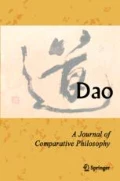Abstract
This essay discusses the goods of friendship as they are articulated by Confucius, Mencius, and Aristotle. It is argued that since Confucius and Mencius tend to conceive personal relationships in hierarchical terms, they do not directly address the goods of symmetrical friendships. Using Aristotle’s account of friendship, I argue that friendship is necessary for the cultivation of virtue outside the family. This is supported by discussing the virtues of generosity, trust, and wisdom as they develop within family life and then are refined in friendships. Lastly, as Confucius, Mencius, and Aristotle agree that the good friendship is necessarily a virtuous one, I consider what value aesthetic friendships have.
Similar content being viewed by others
References
Analects. 1998. In The Analects of Confucius: A Philosophical Translation. Trans. by Ames, Roger T. and Henry Rosemont, Jr. New York: Ballantine Books.
Aristotle. 1968. Nicomachean Ethics. In The Basic Works of Aristotle. Ed. by Richard McKean. New York: Random House.
Badwar, Neera K., ed. 1993. Friendship: A Philosophical Reader. Ithaca, New York: Cornell University Press.
Bolotin, David. 1989. Plato’s Dialogue on Friendship: An Interpretation of the Lysis, With a New Translation. Ithaca, New York: Cornell University Press.
Cocking, Dean and Jeanette Kennett. 1998. “Friendship and the Self.” Ethics 108: 502-527.
_____. 2000. The Journal of Philosophy 97: 278-296.
_____. 2003. “Friendship and Role Morality.” In The Moral Circle and the Self: Chinese and Western Approaches. Ed. by Kim-chong Chong, Sor-hoon Tan, and C.L. Ten. Chicago: Open Court.
Cooper, John. M. 1980. “Aristotle on Friendship.” In Essays on Aristotle’s Ethics. Ed. by Amelie O. Rorty. Berkeley: University of California Press.
_____. 1993. “Political Animals and Civic Friendship.” In Friendship: A Philosophical Reader. Ed. by Neera K. Badwar. Ithaca: New York: Cornell University Press.
Dewey, John. 2002. Human Nature and Conduct. New York: Dover.
Fan, Ruping. 2002. “Reconsidering Surrogate Decision Making: Aristotelianism and Confucianism on Ideal Human Relations.” Philosophy East and West 52.3: 346-372.
Hall, David L. and Roger T. Ames. 1987. Thinking Through Confucius. Albany: State University of New York Press.
_____. 1998. Thinking from the Han: Self, Truth, and Transcendence in Chinese and Western Culture. Albany: State University of New York Press.
Kutcher, Norman. 2000. “The Fifth Relationship: Dangerous Friendships in the Confucian Context.” The American Historical Review 105.5: 1615-1629.
Lamb, W.R.M. 1967. Lysis, Symposium, and Gorgias. Cambridge: Harvard University Press.
Mencius. 2003. Trans. by D.C. Lau. New York: Penguin.
Mullis, Eric C. 2007. “The Ethics of Confucian Artistry.” The Journal of Aesthetics and Art Criticism. 65.1:99-107.
_____. 2008. “Toward a Confucian Ethic of the Gift.” Dao: A Journal of Comparative Philosophy 7.2: 175-194.
Pangle, Lorraine Smith. 2003. Aristotle and the Philosophy of Friendship. Cambridge: Cambridge University Press.
Penner, Terry and Christopher Rowe. 2005. Plato’s Lysis. Cambridge: Cambridge University Press.
Plato. 1989. Lysis. In David Bolotin, Plato’s Dialogue on Friendship: An Interpretation of the Lysis, With a New Translation. Ithaca, New York: Cornell University Press.
Rorty, Amelie O. 1978. “The Place of Contemplation in Aristotle’s Nicomachean Ethics.” Mind 87: 343-358.
Schwarzenbach, Sibyl A. 1996. “On Civic Friendship.” Ethics 107.1: 97-128.
Sim, May. 2007. Remastering Morals with Aristotle and Confucius. Cambridge: Cambridge University Press
Sherman, Nancy. 1993. “Aristotle on the Shared Life.” In Friendship: A Philosophical Reader. Ed. by Neera K. Badwar. Ithaca: New York: Cornell University Press.
Thomas, Lawrence. 1993. “Friendship and Other Loves.” In Friendship: A Philosophical Reader. Ed. by Neera K. Badwar. Ithaca: New York: Cornell University Press.
Tu, Wei-Ming. 1998. “Probing the ‘Three Bonds’ and the ‘Five Relationships’ in Confucian Humanism.” Confucianism and the Family. Ed. By Walter H. Slote and George A. De Vos. Albany: State University of New York Press.
Yu, Jiyuan. 1998. “Virtue: Confucius and Aristotle.” Philosophy East and West 48.2: 323-347.
Author information
Authors and Affiliations
Corresponding author
Rights and permissions
About this article
Cite this article
Mullis, E.C. Confucius and Aristotle on the Goods of Friendship. Dao 9, 391–405 (2010). https://doi.org/10.1007/s11712-010-9185-y
Published:
Issue Date:
DOI: https://doi.org/10.1007/s11712-010-9185-y




